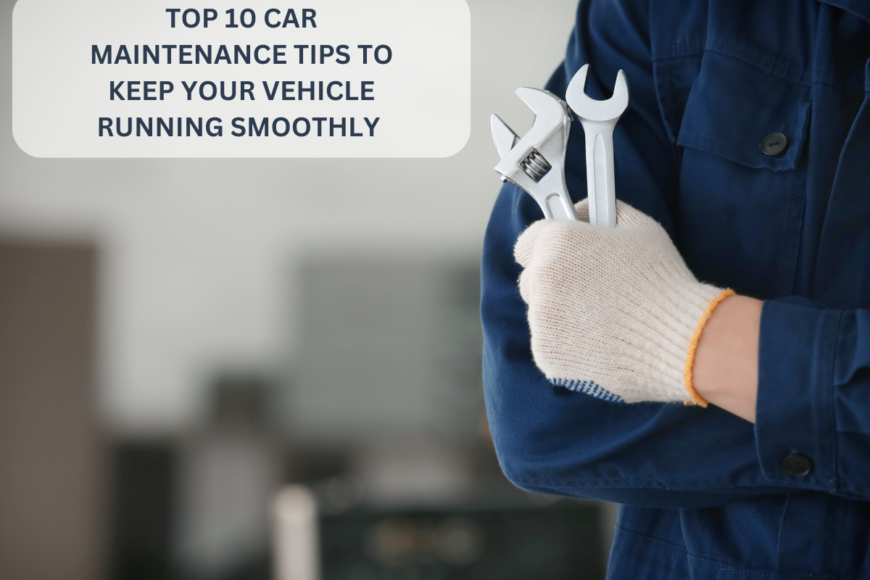- 09/25/2024
- By Auto Planet Wheels
- In Blogs
- Tags Top 10 Car Maintenance Tips
- 258
- 0

Owning a vehicle is both a convenience and a responsibility. To ensure your car runs efficiently and remains reliable for years, regular maintenance and car servicing are essential. Neglecting small repairs or routine checkups can lead to larger, costlier problems down the road. In this blog, we’ll cover the top 10 car maintenance tips to keep your vehicle performing at its best, ensuring safety, durability, and optimal performance.
Oil is the lifeblood of your car’s engine. It lubricates all the internal moving parts, reducing friction and preventing overheating. Over time, oil becomes contaminated with dirt and debris, losing its ability to protect the engine. Regular oil changes are crucial to maintain engine efficiency and prevent wear and tear.
How often should you change the oil?
Most manufacturers recommend changing the oil every 5,000 to 7,500 kilometers, but this depends on the type of oil used and driving conditions. Be sure to check your vehicle’s manual for the recommended interval.
Tip: Keeping an eye on your oil level and checking for any leaks can prevent engine damage.
Your tires are the only part of your car that makes contact with the road, so they need to be in good condition. Properly inflated and aligned tires not only improve fuel efficiency but also ensure safe handling and braking.
What to check?
Tip: Use a tread depth gauge to measure your tire treads, and ensure the pressure is as per the manufacturer’s guidelines.
Air filters play an important role in keeping your engine free from dust, dirt, and debris. A clean air filter ensures that your engine gets the necessary airflow for combustion, improving fuel efficiency and performance. If the air filter gets clogged, your engine has to work harder, leading to reduced performance and higher fuel consumption.
How often should you replace air filters?
Most experts recommend changing the air filter every 15,000 to 20,000 kilometers, but this can vary based on driving conditions. If you drive in dusty environments, you may need to replace the filter more frequently.
Tip: A quick inspection of your air filter when you change your oil can help you determine if it needs replacement.
Your car relies on several fluids to function properly, including brake fluid, coolant, transmission fluid, and power steering fluid. Each of these plays a vital role in your vehicle’s performance.
Tip: Make it a habit to check fluid levels regularly and top them off as needed. Low fluid levels can lead to mechanical failures and costly repairs.
Your car’s braking system is arguably the most important safety feature. Over time, brake pads, rotors, and brake fluid wear out and need to be replaced. Ignoring brake maintenance can result in reduced stopping power or, in extreme cases, brake failure.
Signs you need brake service:
Tip: Regularly inspect your brakes and replace worn-out components promptly to ensure your vehicle’s safety.
Belts and hoses are essential for keeping your engine’s various systems running smoothly. Belts drive critical components such as the alternator, water pump, and air conditioning compressor. Hoses carry essential fluids like coolant, power steering fluid, and transmission fluid. If a belt or hose fails, it can lead to engine overheating, loss of power steering, or even engine failure.
What to look for?
Tip: Have your mechanic inspect belts and hoses regularly and replace them as needed to avoid unexpected breakdowns.
A dead battery can leave you stranded at the worst possible time. Regularly checking your battery ensures that it has enough charge and that there are no corrosion issues.
How to maintain your battery?
Tip: Many auto shops offer free battery testing, so take advantage of these services to avoid unexpected battery failure.
Your vehicle’s lights (headlights, brake lights, turn signals) are essential for visibility and safety on the road. Regularly checking these lights ensures that you can see and be seen by other drivers.
What to check?
Tip: A quick walk around your car once a month to check for any malfunctioning lights can prevent you from being ticketed or, worse, involved in an accident.
An engine tune-up involves checking and replacing spark plugs, ignition coils, and other components to ensure the engine runs efficiently. Regular tune-ups help prevent misfires, improve fuel economy, and ensure optimal performance.
How often should you get a tune-up?
This depends on your car’s make and model. Most vehicles need a tune-up every 50,000 to 100,000 kilometers. However, if you notice rough idling, engine stalling, or reduced fuel efficiency, it may be time for an early tune-up.
Tip: Consult your vehicle’s manual for the recommended tune-up schedule, and don’t ignore warning signs like poor acceleration or misfiring.
A well-functioning air conditioning system is crucial, especially in hot climates. Over time, refrigerant can leak, and components may wear out, leading to reduced cooling efficiency.
How to maintain your car’s A/C?
Tip: If your A/C is blowing warm air or making unusual noises, it’s time to get it checked by a professional.
Maintaining your car regularly may seem like an added expense, but it saves you money in the long run by preventing major breakdowns and improving fuel efficiency. Regular maintenance also ensures your safety on the road and increases your vehicle’s lifespan. With proper care, you can avoid the inconvenience of unexpected repairs and keep your vehicle running smoothly for years.
At Auto Planet Wheels, we prioritize regular car maintenance to ensure your vehicle performs at its best. Our skilled mechanics offer a full range of services, from oil changes and engine diagnostics to brake repairs and tire services. Whether it’s a routine check or major repair, we’ve got you covered. Located in Manpada, Thane West, we provide reliable Car Repair & Services in Thane for all vehicle types. Contact us at 8097421216 or 9594959947 for appointments or enjoy 24/7 roadside assistance at 9594959948. Visit Auto Planet Wheels today—where quality service and your vehicle’s health come first!